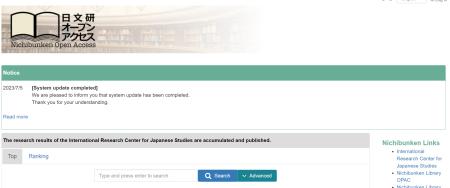ACTIONS
- Protect and safeguard cultural and natural heritage
- Learning and educational opportunities
- Cultural participation/social inclusion
- Sustainable tourism
- Support research
- Employment (recruiting, training, safety)
- Energy consumption, greenhouse gas emissions
- Waste management and reduction
- Transport (forms of, energy use)
- Commercial activities including copyright and IP
- Governance and management
- Security, disaster preparedness, risk reduction
- External partnerships and collaborations
- Sign-post to other resource (database)
Nichibunken Open Access

Intended Audience
Primarily researchers, but it is also suitable for students, educators, and any other professionals who are working with Japan-related collections and/or are interested in Japanese Studies.
- International Research Center for Japanese Studies
‘Nichibunken has been the Center's Japanese-language public relations periodical since 1988. Published once annually, it contains essays, reports of research activities and research cooperation, updates on team research projects, and other news and information from faculty and visiting faculty members. We are always seeking contributions from anyone with a connection to Nichibunken!’
Avaiable in
- English
- Japanese
SDGs LINKAGES
This open-access information hub is helpful for users to familiarise themselves with key and most up-to-date academic and research resources and publications in the field of Japanese Studies. Although there is no mention of the SDGs, it helps address SDG targets 4.7 (global citizenship and appreciation of cultural diversity), 10.2 (inclusion of all, irrespective of ethnicity, origin, and religion), 16.10 (public access to information), 17.6 (enhance global and national-level partnerships in knowledge and expertise sharing in the field of Japanese Studies), and 17.17 (foster partnerships among cultural and research organisations in and beyond Japan).
Click on the SDG Target to discover Our Collections Matter indicators
-
Our Collections Matter indicators:
- Numbers of people in each type of programme drawing on collections from different demographic groups.
- Increases in numbers of people in each type of programme from different demographic groups.
- Proportion of people involved in such programmes in relation to overall audience size.
- Evidence that learners have acquired knowledge and skills to promote sustainable development.
-
Our Collections Matter indicators:
- Collections development to ensure that collections effectively meet the needs of all, irrespective of age, sex, disability, race, ethnicity, origin, religion or economic or other status.
- Number and proportion of educational and participatory programmes that promote participation irrespective of social or other status.
- Numbers and proportions of people making use of collections in relation to the demographic of the local population.
- Numbers and proportions of people involved in focused programmes aimed at promoting social, economic and political inclusion.
- Numbers and proportions of people from different demographic groups involved in decision-making processes relating to collections and collections-based institutions.
- Number and types of partnerships that build relationships with marginalized groups, individuals and communities.
-
Our Collections Matter indicators:
- Adopt and implement constitutional, statutory and/or policy guarantees for public access to information.
- Plans in place, and plans implemented to enhance public access to information relating to collections.
- Plans in place, and plans implemented to support fundamental freedoms, in line with human rights, national and international agreements and legislation.
- Plans and procedures in place for public access to information relating to the operation and management of collections-based institutions.
- Complaint mechanism in place for public to use where public access to information and fundamental freedoms not supported or fulfilled.
-
Our Collections Matter indicators:
- Amount of United States dollars committed to public-private and civil society partnerships.
- Number and/or increase in number, and diversity of local, national and regional multi-stakeholder (public, public-private and civil society) partnerships that address the SDGs drawing on collections, or that otherwise involve collections-based organisations and institutions.
-
Our Collections Matter indicators:
- Number and diversity of North-South, South-South and triangular co-operations and projects to support access to science, technology and innovation and enhance knowledge-sharing on mutually agreed terms.
